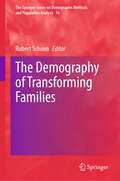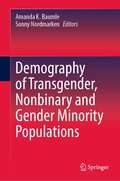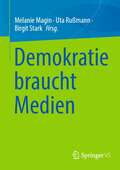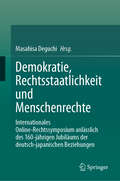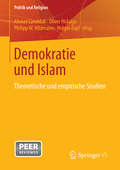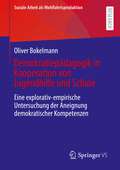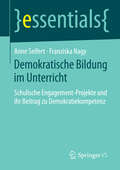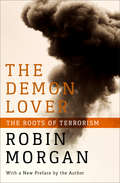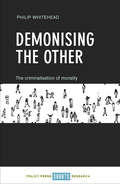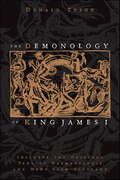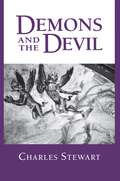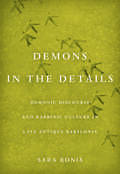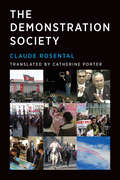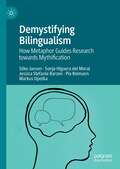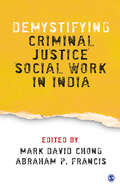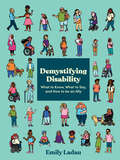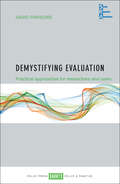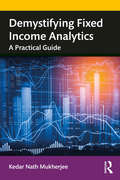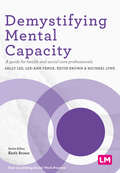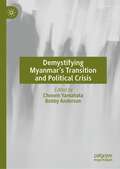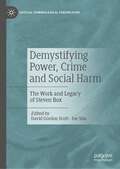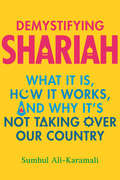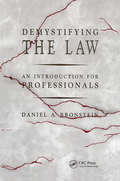- Table View
- List View
The Demography of Transforming Families (The Springer Series on Demographic Methods and Population Analysis #56)
by Robert SchoenThis book provides an up-to-date survey on the nature, causes, and patterns of family change. The traditional nuclear family has been replaced by a multiplicity of other forms, as widespread cohabitation, high levels of divorce and union dissolution, rising childlessness, and far below replacement fertility have emerged to an extent never before seen. Theoretical perspectives on this “Second Demographic Transition” are presented, highlighting the dramatic changes in gender roles. New methodological strategies for assessing family dynamics are presented, from multistate models of marriage and divorce combined with fertility to improved techniques for combining census and survey data on the family to a new approach for disentangling age, period, and cohort effects. While the volume emphasizes Western nations, insightful case studies range from analyzing family complexity in cohorts of parents and children in the UK to the impact of interpartner violence on family formation, to the emergence of a “gender war” in South Korea. By providing new insights into where we are today and how we got here, the book will be of value to all those interested in the contemporary family."Delayed Fertility as a Driver of Fertility Decline?" available open access under a Creative Commons Attribution 4.0 International License via link.springer.com.
Demography of Transgender, Nonbinary and Gender Minority Populations
by Amanda K. Baumle Sonny NordmarkenThis book provides the first compilation of demographic research focused on transgender, nonbinary, and gender minority populations. It discusses the measurement and conceptualization challenges that shape demographic knowledge of these populations, including how we capture gender on surveys. It examines our current knowledge of demographic characteristics and health disparities and outcomes. Overall, this research demonstrates the increasing knowledge of gender variation at the population level. At the same time, it reveals the need for better survey questions, additional data, and inquiry into a broader subset of demographic questions for these populations as there is little understanding of fundamental demographic information, including migration or spatial distribution of transgender populations, fertility and household structure, labor market outcomes, or broader patterns of morbidity and mortality. The research set forth in this book lays the groundwork for a trans demography that would produce population-level knowledge of these populations and points researchers and policymakers toward needed areas of research, conceptualization, and data collection.
Demokratie braucht Medien
by Melanie Magin Uta Rußmann Birgit StarkFreie und unabhängige Medien sind die Grundlage einer lebendigen Demokratie. In normativen Demokratiemodellen wird die „Wächterrolle“ von Medien betont, weil neben der Kontroll- und Informationsfunktion der Medien ihr Beitrag zur Legitimierung politischer Prozesse als zentral angesehen wird. Medien unterliegen jedoch im digitalen Wandel einem hohen Anpassungsdruck: Sie drohen ihre traditionelle Gatekeeper-Rolle zu verlieren und konkurrieren mit globalen Tech-Giganten wie Facebook und Google um Werbegelder und die Aufmerksamkeit des Publikums. Die Plattformisierung der Medien stellt nicht nur die Vermittlungsleistungen professioneller journalistischer Informationsanbieter in Frage, sondern auch die Rolle der Medien in der Herstellung von Öffentlichkeit. Der Band hinterfragt die sich wandelnde Rolle der Medien im politischen System sowie das Verhältnis von Medien und Politik kritisch. Funktionen und Autonomiegrad von Medien und Journalismus werden analysiert. Mithilfe von Zeitvergleichen werden tiefgreifende Veränderungen wie auch Konstanten herausgearbeitet. Nicht zuletzt gilt es zu erörtern, welche Akteure welche Verantwortung tragen und welche Privilegien sie genießen (sollten).
Demokratie, Rechtsstaatlichkeit und Menschenrechte: Internationales Online-Rechtssymposium anlässlich des 160-jährigen Jubiläums der deutsch-japanischen Beziehungen
by Masahisa DeguchiDas Buch basiert auf den Ergebnissen eines internationalen Online-Rechtssymposium anlässlich des 160-jährigen Jubiläums der deutsch-japanischen Beziehungen und setzt sich mit hochaktuellen Fragen zu Demokratie, Rechtsstaatlichkeit und Menschenrechten auseinander. Im ersten Teil steht die Gewährleistung der Grundrechte von Gläubigern und Schuldnern in der deutschen Zwangsvollstreckung sowie Frage- und Antwortrunden zwischen Wissenschaftlern und Praktikern aus der Perspektive des japanischen Zwangsvollstreckungsrechts im Mittelpunkt. In Teil 2 befassen sich Rechtswissenschaftlern und -praktikern aus Deutschland, Japan, Großbritannien und anderen Ländern mit der Bedeutung und den Problemen der Sportschiedsgerichtsbarkeit aus der Perspektive der grundlegenden Menschenrechte. Der dritte Teil behandelt die Corona-Pandemie aus verfassungsrechtlicher, zivilrechtlicher, strafrechtlicher, konkursrechtlicher und arbeitsrechtlicher Sicht. Im vierten Teil beschäftigen sich Rechtswissenschaftler und -praktiker aus Japan, Deutschland, Korea und den Niederlanden mit Fragen der Harmonisierung von Verfassungs- und Verfahrensgrundsätzen im Zuge der Digitalisierung von Zivilprozessen, die sich seit der Corona-Pandemie rasant ausgebreitet hat. Teil 5 geht abschließend auf die Bedeutung des vergleichenden Prozessrechts für die Entwicklung des Zivilprozessrechts in der Welt, sowohl aus theoretischer als auch aus praktischer Sicht ein.
Demokratie und Islam
by Ahmet Cavuldak Oliver Hidalgo Philipp W. Hildmann Holger ZapfDer Islam zählt heute zu den größten Herausforderungen für den demokratischen Rechtsstaat. Außenpolitisch stehen die Transformationsprozesse in der arabischen Welt, innenpolitisch die Integration muslimischer Migranten im Fokus. Die Angst vor einer fundamentalistischen Unterwanderung der Demokratie sowie die oft schwer zu ziehende Grenze zwischen Islam und Islamismus sorgen in der Öffentlichkeit für Verunsicherung. Nur selten wird der Islam als demokratieaffiner Faktor wahrgenommen. Der Band legt in diesem schwierigen Forschungsfeld fundierte und differenzierte Expertisen vor. Er reflektiert die Komplexität des Verhältnisses von Demokratie und Islam, taxiert Chancen und Risiken und gleicht vorhandene Befunde ab. Dabei wird geprüft, welchen Beitrag islamische Demokratievorstellungen in der Debatte leisten und ob die westlichen Gesellschaften ihrerseits zur Neubestimmung der Beziehung zwischen Politik und Religion gezwungen sind.
Demokratie und Soziale Arbeit: Sensibilisierung für die Wahrnehmung und Veränderung von Ungleichheiten in unserer Gesellschaft
by Monika Alamdar-Niemann Bärbel Schomers Marion TackeDer Tagungsband „Demokratie und Soziale Arbeit“ befasst sich aus unterschiedlichen Perspektiven mit zentralen aktuellen Fragen der Sozialen Arbeit. Wie kann Teilhabe und Partizipation in der Gesellschaft ungeachtet der sozialen Lage der Adressat*innen, ihres Geschlechts, ihrer sexuellen Orientierung, ihrer ethnischen Herkunft und Hautfarbe, ihrer Religion und Sprache, ihres Alters und rechtlichen Status ermöglicht werden? Soziale Arbeit mit Blick auf die zugrundeliegenden strukturellen Mechanismen von Ausgrenzung und Abwertung zielt auf eine Humanisierung der deutschen Gesellschaft. Es geht um nicht weniger als die Professionalisierung einer Arbeit gegen Diskriminierung zur Wahrung demokratischer Prinzipien, denen sich die hier versammelten Autor*innen widmen.
Demokratiepädagogik in Kooperation von Jugendhilfe und Schule: Eine explorativ-empirische Untersuchung der Aneignung demokratischer Kompetenzen (Soziale Arbeit als Wohlfahrtsproduktion #25)
by Oliver BokelmannDas Buch untersucht Aneignungsprozesse demokratischer Kompetenzen Jugendlicher in Kooperationsprojekten von Jugendhilfe und Schule. Überlegungen zur Demokratiepädagogik in der Kinder- und Jugendhilfe sowie demokratietheoretische Betrachtungen stellen dabei die theoretischen Grundlagen dar. Durch teilnehmende Beobachtungen und Interviews wird gezeigt, dass durch Kooperation ein ‚fluider Zwischenraum‘ entsteht, den keine der beiden Institutionen ausschließlich für sich beanspruchen kann. Der Reflexionen über die Genese und Konstitution dieses pädagogischen Raumes kommt dementsprechend besondere Bedeutung zu.
Demokratische Bildung im Unterricht: Schulische Engagement-Projekte und ihr Beitrag zu Demokratiekompetenz (essentials)
by Anne Seifert Franziska NagyWer gestaltet unsere Demokratie? Wie werden Jugendliche zu Gestaltern ihrer eigenen Gegenwart und Zukunft in einer demokratischen Gesellschaft? Und welche Rolle können Erfahrungen in der Schule dabei spielen? Mit diesen Fragen beschäftigt sich dieser Beitrag. Am Beispiel der Lehr- und Lernform Service-Learning untersuchen die Autorinnen, ob und wie sich Demokratiekompetenz bereits in jungen Jahren erlernen lässt.
The Demon Lover: The Roots of Terrorism
by Robin MorganA riveting exploration of terrorism&’s relationship to sex, with a new preface by the author Terrorism is the international crime that has captured the attention of the entire world, forcing governments to make radical changes in security and civil liberties. Meanwhile, everyone tries to comprehend the real reasons that inspire such violence. This is where political philosopher Robin Morgan begins The Demon Lover, a groundbreaking work of investigative journalism and a bestseller in the print edition. Through her globe-spanning examination of terrorism, Morgan unearths the roots of the phenomenon. With wide-ranging research across historical eras and a three-hundred-sixty-degree approach, she examines how violence has become eroticized—and conflated with masculinity—to the lethal detriment of both women and men. Recent scientific studies referenced in the preface to this edition prove just how ahead of her time Morgan has been with her analysis. Her account of her own personal experience with militant tactics adopted by US radicals in the 1960s and 1970s is extraordinary, and her reports on and interviews with Palestinian women in the refugee camps of the Middle East—women confiding for the first time, as women, details of their lives under terrorism every day—are deeply moving. Morgan also offers a compelling vision of hope for change, and an afterword includes her famous &“Letters from Ground Zero,&” written after 9/11.The Demon Lover is Robin Morgan at her most intelligent and unforgettable.
Demonising the Other: The Criminalisation of Morality
by Philip WhiteheadThroughout history there has always been an ‘other’, often based on culture, race, gender or class, that has been demonised by the majority. This attribution of negative features onto others affects everyone, but Whitehead challenges the idea that this is an inevitable fact of life. While looking at the historical criminalisation of the ‘other’ and the subsequent modernising transformations in criminal justice and penal policy, such as ‘Big Society’, Whitehead also questions if this is the most effective way to dismantle the conditions of existence responsible for ‘othering’. This important book not only looks for the origin of the ‘other’ but also offers insights for a resolution that benefits society as a whole rather than just the powerful few.
The Demonology of King James I: Includes the Original Text of Daemonologie and News from Scotland
by Donald TysonWritten by King James I and published in 1597, the original edition of Demonology is widely regarded as one of the most interesting and controversial religious writings in history, yet because it is written in the language of its day, it has been notoriously difficult to understand.Now occult scholar Donald Tyson has modernized and annotated the original text, making this historically important work accessible to contemporary readers. Also deciphered here, for the first time, is the anonymous tract News from Scotland, an account of the North Berwick witch trials over which King James presided.Tyson examines King James' obsession with witches and their alleged attempts on his life, and offers a knowledgeable and sympathetic look at the details of magick and witchcraft in the Jacobean period. Demonology features historical woodcut illustrations and includes the original old English texts in their entirety. This reference work is the key to an essential source text on seventeenth-century witchcraft and the Scottish witch trials
Demons and the Devil: Moral Imagination in Modern Greek Culture (Princeton Modern Greek Studies #38)
by Charles StewartIn present-day Greece many people still speak of exotikNB--mermaids, dog-form creatures, and other monstrous beings similar to those pictured on medieval maps. Challenging the conventional notion that these often malevolent demons belong exclusively to a realm of folklore or superstition separate from Christianity, Charles Stewart looks at beliefs about the exotikNB and the Orthodox Devil to demonstrate the interdependency of doctrinal and local religion. He argues persuasively that students who cling to the timeworn folk/official distinction will find it impossible to appreciate the breadth and coherence of contemporary Greek cosmology. Like the medieval cartographers' fantasies, which were placed on the "edges" of the physical world, Greek demons cluster in marginal locations--outlying streams, wells, and caves. The demons are near enough to the community, however, to attack humans--causing illness or death, according to Stewart's informants. Drawing on an unusual range of sources, from the author's fieldwork on the Cycladic island of Naxos to Orthodox liturgical texts, this book pictures the exotikNB as elements of a Greek cognitive map: figures that enable individuals to navigate the traumas and ambiguities of life. Stewart also examines the social forces that have by turns disposed the Greek people to embrace these demons as indicative of links with the classical past or to eschew them as signs of backwardness and ignorance.
Demons in the Details: Demonic Discourse and Rabbinic Culture in Late Antique Babylonia
by Sara RonisThe Babylonian Talmud is full of stories of demonic encounters, and it also includes many laws that attempt to regulate such encounters. In this book, Sara Ronis takes the reader on a journey across the rabbinic canon, exploring how late antique rabbis imagined, feared, and controlled demons. Ronis contextualizes the Talmud's thought within the rich cultural matrix of Sasanian Babylonia, placing rabbinic thinking in conversation with Sumerian, Akkadian, Ugaritic, Syriac Christian, Zoroastrian, and Second Temple Jewish texts about demons to delve into the interactive communal context in which the rabbis created boundaries between the human and the supernatural, and between themselves and other religious communities. Demons in the Details explores the wide range of ways that the rabbis participated in broader discussions about beliefs and practices with their neighbors, out of which they created a profoundly Jewish demonology.
The Demonstration Society (Infrastructures)
by Claude RosentalToday, as in the past, public demonstrations are not only tools to prove, persuade, and promote, but also fundamental forms of social interaction and exchange.YouTube demos of makeup products by famous influencers, demonstrations of strength during street protests, demonstrations of military might in North Korea: public demonstrations are omnipresent in social life. Yet they are often perceived as isolated events, unworthy of systematic examination. In The Demonstration Society, Claude Rosental explores the underlying dynamics of what he calls a &“demonstration society.&” He shows how, both in today&’s world and historically, public demonstrations constitute not only tools to prove, persuade, and promote, but fundamental forms of interaction and exchange, and, in some cases, attempts to lead the world. Rosental compares demos with other forms of public demonstrations, drawing out both their peculiarities and common features. He analyzes the processes through which demonstrations are conceived and carried out, as well as the skills of their producers. He also compares contemporary demos with historical demonstrations including theaters of machines in the Renaissance, public demonstrations of natural philosophy in the seventeenth century, and demonstrations of the magic lantern in the nineteenth century. Above and beyond the entertainment they sometimes provide, demonstrations are experienced as intense moments that broadly involve alliances, material and symbolic goods, and, more generally, the future of individuals and collectives. Rosental elucidates the many ways in which we live today, as in the past, in a society of demonstration.
Demystifying Bilingualism: How Metaphor Guides Research towards Mythification
by Silke Jansen Sonja Higuera del Moral Jessica Stefanie Barzen Pia Reimann Markus OpolkaThis book analyses changing views on bilingualism in Cognitive Psychology and explores their socio-cultural embeddedness. It offers a new, innovative perspective on the debate on possible cognitive (dis)advantages in bilinguals, arguing that it is biased by popular “language myths”, which often manifest themselves in the form of metaphors. Since its beginnings, Cognitive Psychology has consistently modelled the coexistence between languages in the brain using metaphors of struggle, conflict and competition. However, an ideological shift from nationalist and monolingual ideologies to the celebration of bilingualism under multicultural and neoliberal ideologies in the course of the 20th century fostered opposing interpretations of language coexistence in the brain and its effects on bilinguals at different moments in time. This book will be of interest to students and scholars of Cognitive Psychology, Psycholinguistics, Multilingualism and Applied Linguistics, Cognitive and Computational Linguistics, and Critical Metaphor Analysis.
Demystifying Criminal Justice Social Work in India
by Mark David Chong and Abraham P. FrancisThis book addresses a gap in the academic and professional literature in the area of criminal justice social work. This compilation explores the scope of responsibilities undertaken by social workers in the field of criminal law in India when dealing with clients who are either offenders or victims of crime. It provides an in-depth understanding of the socio-structural, legal and practical challenges faced by Indian criminal justice social workers. The book encourages social work professionals and students to consider three major areas: encouraging education and training in this subject; protecting the human rights of offenders and victims of crime; and addressing mental illness within the criminal justice system. It hopes to demystify social work in the area of criminal justice, particularly because of the stigma attached to it, given the potentially coercive enforcement of criminal law alongside the traditional ethos of social work being primarily about ‘caring’, ‘empathy’ and ‘empowerment’.
Demystifying Disability: What to Know, What to Say, and How to Be an Ally
by Emily LadauAn approachable guide to being a thoughtful, informed ally to disabled people, with actionable steps for what to say and do (and what not to do) and how you can help make the world a more inclusive place ONE OF THE BEST BOOKS OF THE YEAR: NPR, Booklist • &“A candid, accessible cheat sheet for anyone who wants to thoughtfully join the conversation . . . Emily makes the intimidating approachable and the complicated clear.&”—Rebekah Taussig, author of Sitting Pretty: The View from My Ordinary, Resilient, Disabled Body People with disabilities are the world&’s largest minority, an estimated 15 percent of the global population. But many of us—disabled and nondisabled alike—don&’t know how to act, what to say, or how to be an ally to the disability community. What are the appropriate ways to think, talk, and ask about disability? Demystifying Disability is a friendly handbook on the important disability issues you need to know about, including:• Recognizing and avoiding ableism (discrimination toward disabled people)• Practicing good disability etiquette• Ensuring accessibility becomes your standard practice, from everyday communication to planning special events• Appreciating disability history and identity• Identifying and speaking up about disability stereotypes in media Authored by celebrated disability rights advocate, speaker, and writer Emily Ladau, this practical, intersectional guide offers all readers a welcoming place to understand disability as part of the human experience.Praise for Demystifying Disability&“Whether you have a disability, or you are non-disabled, Demystifying Disability is a MUST READ. Emily Ladau is a wise spirit who thinks deeply and writes exquisitely.&”—Judy Heumann, international disability rights advocate and author of Being Heumann &“Emily Ladau has done her homework, and Demystifying Disability is her candid, accessible cheat sheet for anyone who wants to thoughtfully join the conversation. A teacher who makes you forget you&’re learning, Emily makes the intimidating approachable and the complicated clear. This book is a generous and needed gift.&”—Rebekah Taussig, author of Sitting Pretty: The View from My Ordinary Resilient Disabled Body
Demystifying Evaluation: Practical Approaches for Researchers and Users (Social Research Association Shorts)
by David ParsonsSocial research practitioners and others working in the public and voluntary sectors, in academia and consultancy are increasingly under pressure to provide policy-related evidence with limited resources and rising expectations. Demystifying evaluation is an accessible introductory guide setting the foundations for tackling those challenges, explaining the options open to evaluators, their merits and uses, and how to make appropriate choices of research methods. Drawing on his experience of policy and programme evaluations for the public sector and outside, David Parsons provides a practical roadmap cutting across different evaluation theories. He covers issues such as managing expectations of evaluation, using and mixing quantitative and qualitative methods, engaging stakeholders and providing action-orientated approaches to help end-users.
Demystifying Fixed Income Analytics: A Practical Guide
by Kedar Nath MukherjeeThis book discusses important aspects of fixed income securities in emerging economies. Key features • Clarifies all conceptual and analytical aspects of fixed income securities and bonds, and covers important interest rate and credit derivative instruments in a simple and practical way. • Examines topics such as classifications of fixed income instruments; related risk-return measures; yield curve and term structure of interest rates; interest rate derivatives (forwards, futures and swaps), credit derivatives (credit default swaps); and trading strategies and risk management. • Provides step-by-step explanation of fixed income products by including real-life examples, scenarios and cases, especially in the context of emerging markets. • Presents consistent reference of actual market practices to make the chapters practice oriented while maintaining a lucid style complemented by adequate reading inputs and clear learning outcomes. • Includes complete solutions of numericals and cases for all chapters as an eResource on the Routledge website to aid understanding. The book will serve as a ready guide to both professionals from banking and finance industry (fixed income/bond dealers; fund/investment/portfolio managers; investment bankers; financial analysts/consultants; risk management specialists), and those in academics, including students, research scholars, and teachers in the fields of business management, banking, insurance, finance, financial economics, business economics, and risk management.
Demystifying Mental Capacity: A guide for health and social care professionals (Post-Qualifying Social Work Practice Series)
by Sally Lee Lee-Ann Fenge Keith Brown Michael LyneThis very practical book helps professionals and students to engage critically with their practice by addressing mental capacity and adult safeguarding. Its accessible and easy to navigate format include key topics surrounding assisted decision making, deprivation of liberty, and consent.
Demystifying Mental Capacity: A guide for health and social care professionals (Post-Qualifying Social Work Practice Series)
by Sally Lee Lee-Ann Fenge Keith Brown Michael LyneThis very practical book helps professionals and students to engage critically with their practice by addressing mental capacity and adult safeguarding. Its accessible and easy to navigate format include key topics surrounding assisted decision making, deprivation of liberty, and consent.
Demystifying Myanmar’s Transition and Political Crisis
by Chosein Yamahata Bobby AndersonThis book offers the assessment of Myanmar’s societal changes, development aspects, and political situation over the course of the nation’s short lived democratic transition disrupted by the coup d’état on 1 February 2021. A multitude of authors with different expertise add new dimensions of analysis to provide a foundation for any future international cooperation in Myanmar’s center and peripheries. The military’s institutionalization of its influence and control in political, economic and social affairs has negatively affected the safety, security and peace of people and their communities at the periphery. This in turn has led the people to undertake local grassroots initiatives towards securing a genuine democratic transition at the local and national level. The chapters probe into Myanmar’s transition and political crisis through in-depth discussion on the issues such as, but not limited to, state fragility, community resilience, political leadership, ethnic women’s organizations, human security, education equality, IDPs and non-state actors, ethnic community-based health organizations, the 2020 election, peace process, development issues, the coup’s destruction, and a new-born unity. The book covers an important collection of inputs from young and prominent scholars alike, offering a valuable resource for general readers, students, and practitioners. The editors present this volume as a vital collection to literature at a time of heated political crisis and societal responses on her current course since the contributors highlight the state of Myanmar by also focusing on the margins, the grassroots, and the recent coup.
Demystifying Power, Crime and Social Harm: The Work and Legacy of Steven Box (Critical Criminological Perspectives)
by David Gordon Scott Joe SimThis collection revisits Steven Box’s book, Power, Crime and Mystification, published in 1983, and considers its relevance forty years on. It introduces the critical analysis developed by Box which examined corporate crime, police crime, rape and sexual assault and female crime and analyses the continuities and discontinuities since 1983 in relation to crime, the state and the exercise/mystification of power. The book explores the ways in which we can see his influence nationally and internationally on critical criminological, zemiological and abolitionist writings today. It asks how can these perspectives be applied to a critical analysis of contemporary, state authoritarianism and the criminal injustice that this authoritarianism generates? Additionally, how can Box’s concepts shine a critical light on contemporary social harms that were not covered in the original book? The collection provides a toolkit for students and academics to critically analyse the issues around crime/social harm, power/powerlessness, truth/mystification, criminal injustice/social justice as well as historical and contemporary sites of resistance confronting the exercise of state power.
Demystifying Shariah: What It Is, How It Works, and Why It’s Not Taking Over Our Country
by Sumbul Ali-KaramaliA direct counterpoint to fear mongering headlines about shariah law--a Muslim American legal expert tells the real story, eliminating stereotypes and assumptions with compassion, irony, and humor.Through scare tactics and deliberate misinformation campaigns, anti-Muslim propagandists insist wrongly that shariah is a draconian and oppressive Islamic law that all Muslims must abide by. They circulate horror stories, encouraging Americans to fear the "takeover of shariah" law in America and even mounting "anti-shariah protests" . . . . with zero evidence that shariah has taken over any part of our country. (That's because it hasn't.) It would be almost funny if it weren't so terrifyingly wrong--as puzzling as if Americans suddenly began protesting the Martian occupation of Earth.Demystifying Shariah explains that shariah is not one set of punitive rules or even law the way we think of law--rigid and enforceable--but religious rules and recommendations that provide Muslims with guidance in various aspects of life. Sumbul Ali-Karamali draws on scholarship and her degree in Islamic law to explain shariah in an accessible, engaging narrative style--its various meanings, how it developed, and how the shariah-based legal system operated for over a thousand years. She explains what shariah means not only in the abstract but in the daily lives of Muslims. She discusses modern calls for shariah, what they mean, and whether shariah is the law of the land anywhere in the world. She also describes the key lies and misunderstandings about shariah circulating in our public discourse, and why so many of them are nonsensical. This engaging guide is intended to introduce you to the basic principles, goals, and general development of shariah and to answer questions like: How do Muslims engage with shariah? What does shariah have to do with our Constitution? What does shariah have to do with the way the world looks like today? And why do we all--Muslims or not--need to care?
Demystifying the Law: An Introduction for Professionals
by Daniel A. BronsteinDemystifying the Law: An Introduction for Professionals explains unfamiliar legal concepts in interesting contexts, thus helping you to understand and remember them. It illustrates legal principles using simple examples that anyone can understand. No single book can turn you into a lawyer, but this one can help you decide when you need a lawyer's assistance and help you ask intelligent questions of your lawyer. It can even help keep you out of situations requiring a lawyer. Part I tells you where our laws come from and how they are applied in the court system. Part II explains the role in law of the executive branch of government, including quasi-legislative and quasi-judicial activities, judicial review, and technicalities and terms. Part III covers several specific legal issues, including civil procedure, criminal law concepts, burden of proof, the "reasonable person" concept, breach of duty, personal and product liability, and malpractice. It also gives brief introductions to contracts, insurance law, workers' compensation, property law, environmental law, water law, and other legal matters. Every professional should own this valuable resource! Ideal for both personal and business use. Appendices include how to find legal citations and extracts from the federal rules of civil procedure.
